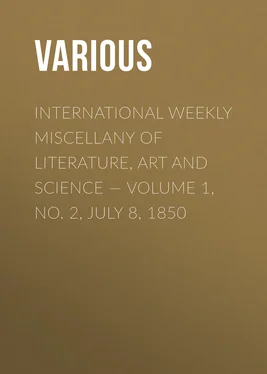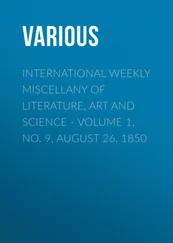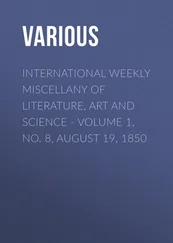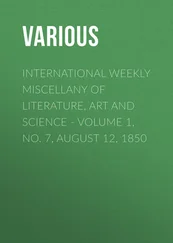Various - International Weekly Miscellany of Literature, Art and Science — Volume 1, No. 2, July 8, 1850
Здесь есть возможность читать онлайн «Various - International Weekly Miscellany of Literature, Art and Science — Volume 1, No. 2, July 8, 1850» — ознакомительный отрывок электронной книги совершенно бесплатно, а после прочтения отрывка купить полную версию. В некоторых случаях можно слушать аудио, скачать через торрент в формате fb2 и присутствует краткое содержание. Жанр: foreign_antique, periodic, foreign_edu, на английском языке. Описание произведения, (предисловие) а так же отзывы посетителей доступны на портале библиотеки ЛибКат.
- Название:International Weekly Miscellany of Literature, Art and Science — Volume 1, No. 2, July 8, 1850
- Автор:
- Жанр:
- Год:неизвестен
- ISBN:нет данных
- Рейтинг книги:5 / 5. Голосов: 1
-
Избранное:Добавить в избранное
- Отзывы:
-
Ваша оценка:
- 100
- 1
- 2
- 3
- 4
- 5
International Weekly Miscellany of Literature, Art and Science — Volume 1, No. 2, July 8, 1850: краткое содержание, описание и аннотация
Предлагаем к чтению аннотацию, описание, краткое содержание или предисловие (зависит от того, что написал сам автор книги «International Weekly Miscellany of Literature, Art and Science — Volume 1, No. 2, July 8, 1850»). Если вы не нашли необходимую информацию о книге — напишите в комментариях, мы постараемся отыскать её.
International Weekly Miscellany of Literature, Art and Science — Volume 1, No. 2, July 8, 1850 — читать онлайн ознакомительный отрывок
Ниже представлен текст книги, разбитый по страницам. Система сохранения места последней прочитанной страницы, позволяет с удобством читать онлайн бесплатно книгу «International Weekly Miscellany of Literature, Art and Science — Volume 1, No. 2, July 8, 1850», без необходимости каждый раз заново искать на чём Вы остановились. Поставьте закладку, и сможете в любой момент перейти на страницу, на которой закончили чтение.
Интервал:
Закладка:
"My daily walk was to Fiesole, through a path skirted with wild myrtle and cyclamen; and I stopped at the door of the Doccia, and sate on the pretty melancholy platform behind it, reading, or looking down to Florence."
This is all very charming, yet hear what the author says further:—
"Some people, when they return from Italy, say it has no wood, and some a great deal. The fact is, that many parts of it, Tuscany included, has no wood to speak of : it wants larger trees interspersed with the small ones, in the manner of our hedge-row elms. A tree of a reasonable height is a god-send. The olives are low and hazy-looking, like dry sallows. You have plenty of these; but to an Englishman, looking from a height, they appear little better than brushwood. Then there are no meadows, no proper green fields in June; nothing of that luxurious combination of green and russet, of grass, wild flowers, and woods, over which a lover of nature can stroll for hours, with a foot as fresh as the stag's; unmixed with chalk-dust, and an eternal public path, and able to lie down, if he will, and sleep in clover. In short—saving, alas! a finer sky and a drier atmosphere—we have the best part of Italy in books; and this we can enjoy in England. Give me Tuscany in Middlesex or Berkshire, and the Valley of Ladies between Jack Straw's Castle and Harrow.... To me, Italy had a certain hard taste in the mouth: its mountains were too bare, its outlines too sharp, its lanes too stony, its voices too loud, its long summer too dusty. I longed to bathe myself in the grassy balm of my native fields."
As a whole these volumes are full of interest and variety. They introduce us to numerous famous people, and leave us with a most agreeable impression of their author.
THE MORMONS
THOMAS L. KANE, of Philadelphia, distinguished himself very honorably a year or two ago by the vindication of the Mormons against calumnies to which they had been subjected in the Western States, and by appeals for their relief from the sufferings induced by unlooked-for exposure in their exodus to California. We are indebted to him for an interesting discourse upon the subject, delivered before the Historical Society of Pennsylvania. He concludes this performance with the following observations, which we believe to be altogether just. Mr. KANE is a man of sagacity and integrity, and his opportunities for the formation of a wise opinion upon this subject were such as very few have possessed:
"I have gone over the work I assigned myself when I accepted your Committee's invitation, as fully as I could do without trespassing too largely upon your courteous patience. But I should do wrong to conclude my lecture without declaring in succinct and definite terms, the opinions I have formed and entertain of the Mormon people. The libels, of which they have been made the subject, make this a simple act of justice. Perhaps, too, my opinion, even with those who know me as you do, will better answer its end following after the narrative I have given.
"I have spoken to you of a people; whose industry had made them rich, and gathered around them all the comforts, and not a few of the luxuries of refined life; expelled by lawless force into the wilderness; seeking an untried home far away from the scenes which their previous life had endeared to them; moving onward, destitute, hunger-sickened, and sinking with disease; bearing along with them their wives and children, the aged, and the poor, and the decrepid; renewing daily on their march, the offices of devotion, the ties of family, and friendship, and charity; sharing necessities, and braving dangers together, cheerful in the midst of want and trial, and persevering until they triumphed. I have told, or tried to tell you, of men, who when menaced by famine, and in the midst of pestilence, with every energy taxed by the urgency of the hour, were building roads and bridges, laying out villages, and planting cornfields, for the stranger who might come after them, their kinsman only by a common humanity, and peradventure a common suffering,—of men, who have renewed their prosperity in the homes they have founded in the desert,—and who, in their new built city, walled round by mountains like a fortress, are extending pious hospitalities to the destitute emigrants from our frontier lines,—of men who, far removed from the restraints of law, obeyed it from choice, or found in the recesses of their religion, something not inconsistent with human laws, but far more controlling; and who are now soliciting from the government of the United States, not indemnity,—for the appeal would be hopeless, and they know it—not protection, for they now have no need of it,—but that identity of political institutions and that community of laws with the rest of us, which was confessedly their birthright when they were driven beyond our borders.
"I said I would give you the opinion I formed of the Mormons: you may deduce it for yourselves from these facts. But I will add that I have not yet heard the single charge against them as a community, against their habitual purity of life, their integrity of dealing, their toleration of religious differences in opinion, their regard for the laws, or their devotion to the constitutional government under which we live, that I do not from my own observation, or the testimony of others, know to be unfounded."
Original Poetry
THE BRIDE'S REVERIE
Lonely to-night, oh, loved one! is our dwelling,
And lone and wearily hath gone the day;
For thou, whose presence like a flood is swelling
With joy my life-tide—thou art far away.
And wearily for me will go the morrow,
While for thy voice, thy smile, I vainly yearn;
Oh, from fond thought some comfort I will borrow,
To wile away the hours till thou return!
I will remember that first, sweet revealing
Wherewith thy love o'er my tranced being stole;
I, like the Pythoness enraptured, feeling
The god divine pervading all my soul.
I will remember each fond aspiration
In secret milled with thy cherished name,
Till from thy lips, in wildering modulation,
Those words of ecstasy "I love thee!" came.
And I will think of all our blest communing,
And all thy low-breathed words of tenderness;
Thy voice to me its melody attuning
Till every tone seemed fraught with a caress.
And feel thee near me, while in thought repeating
The treasured memories thou alone dost share
Hark! with hushed breath and pulses wildly beating
I hear thy footstep bounding o'er the stair!
And I no longer to my heart am telling
The weary weight of loneliness it bore;
For thou, whose love makes heaven within our dwelling,
Thou art returned, and all is joy once more.
TO ——. By Mrs. R.B.K
Oh how I loved thee! how I blessed the hour,
When first thy lips, wak'ning my trusting heart,
Like some soft southern gale upon a flower,
Into a blooming hope, murmured "we ne'er will part."
Never to part! alas! the lingering sound
Thro' the sad echoes of pale Memory's cave,
Startles once more the hope my young soul found,
Into bright hues, but, only for the grave ...
Must we then part! ah, till this heavy hour,
Fraught with the leaden weight of sorrowing years,
I could have stemmed grief's tide like some light shower,
Where shows a rainbow hope to quell all idle fears.
But the dim phantoms of o'er shadowed pleasures,
Gleaming thro' gathering mists that cloud my heart,
Lend but a transient ray, those fragile treasures—
And heavier darkness falls to gloom the thought "We part!"
Интервал:
Закладка:
Похожие книги на «International Weekly Miscellany of Literature, Art and Science — Volume 1, No. 2, July 8, 1850»
Представляем Вашему вниманию похожие книги на «International Weekly Miscellany of Literature, Art and Science — Volume 1, No. 2, July 8, 1850» списком для выбора. Мы отобрали схожую по названию и смыслу литературу в надежде предоставить читателям больше вариантов отыскать новые, интересные, ещё непрочитанные произведения.
Обсуждение, отзывы о книге «International Weekly Miscellany of Literature, Art and Science — Volume 1, No. 2, July 8, 1850» и просто собственные мнения читателей. Оставьте ваши комментарии, напишите, что Вы думаете о произведении, его смысле или главных героях. Укажите что конкретно понравилось, а что нет, и почему Вы так считаете.












